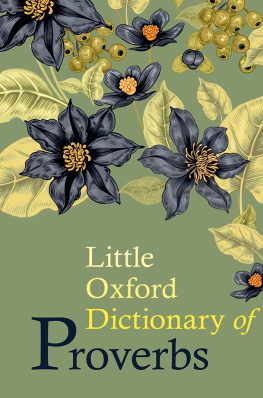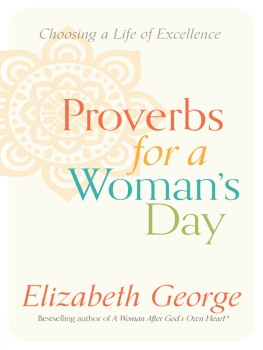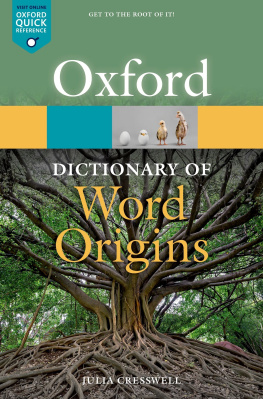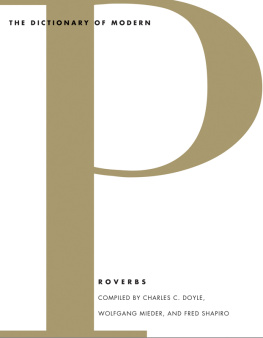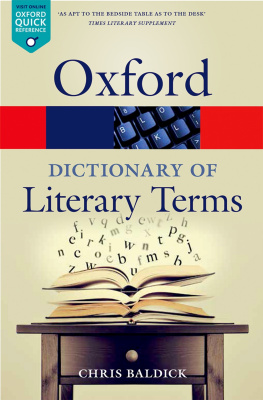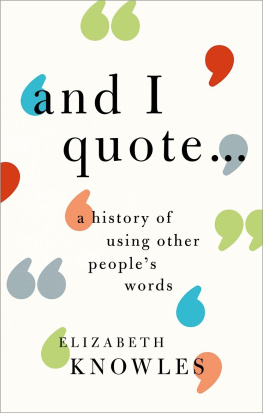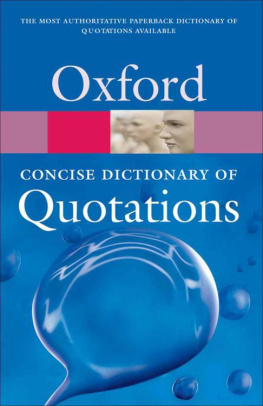Knowles Elizabeth - Little Oxford Dictionary of Proverbs
Here you can read online Knowles Elizabeth - Little Oxford Dictionary of Proverbs full text of the book (entire story) in english for free. Download pdf and epub, get meaning, cover and reviews about this ebook. City: Oxford, England, year: 2016, publisher: Oxford University Press, Incorporated, genre: Children. Description of the work, (preface) as well as reviews are available. Best literature library LitArk.com created for fans of good reading and offers a wide selection of genres:
Romance novel
Science fiction
Adventure
Detective
Science
History
Home and family
Prose
Art
Politics
Computer
Non-fiction
Religion
Business
Children
Humor
Choose a favorite category and find really read worthwhile books. Enjoy immersion in the world of imagination, feel the emotions of the characters or learn something new for yourself, make an fascinating discovery.
- Book:Little Oxford Dictionary of Proverbs
- Author:
- Publisher:Oxford University Press, Incorporated
- Genre:
- Year:2016
- City:Oxford, England
- Rating:4 / 5
- Favourites:Add to favourites
- Your mark:
- 80
- 1
- 2
- 3
- 4
- 5
Little Oxford Dictionary of Proverbs: summary, description and annotation
We offer to read an annotation, description, summary or preface (depends on what the author of the book "Little Oxford Dictionary of Proverbs" wrote himself). If you haven't found the necessary information about the book — write in the comments, we will try to find it.
Little Oxford Dictionary of Proverbs — read online for free the complete book (whole text) full work
Below is the text of the book, divided by pages. System saving the place of the last page read, allows you to conveniently read the book "Little Oxford Dictionary of Proverbs" online for free, without having to search again every time where you left off. Put a bookmark, and you can go to the page where you finished reading at any time.
Font size:
Interval:
Bookmark:

Little Oxford Dictionary of Proverbs To find an entry in this e-book you can:
 Great Clarendon Street, Oxford, ox2 6dp , United Kingdom Oxford University Press is a department of the University of Oxford. It furthers the Universitys objective of excellence in research, scholarship, and education by publishing worldwide. Oxford is a registered trade mark of Oxford University Press in the UK and in certain other countries Oxford University Press 2009, 2016 The moral rights of the author have been asserted First Edition published in 2009 Second Edition published in 2016 All rights reserved. No part of this publication may be reproduced, stored in a retrieval system, or transmitted, in any form or by any means, without the prior permission in writing of Oxford University Press, or as expressly permitted by law, by licence or under terms agreed with the appropriate reprographics rights organization.
Great Clarendon Street, Oxford, ox2 6dp , United Kingdom Oxford University Press is a department of the University of Oxford. It furthers the Universitys objective of excellence in research, scholarship, and education by publishing worldwide. Oxford is a registered trade mark of Oxford University Press in the UK and in certain other countries Oxford University Press 2009, 2016 The moral rights of the author have been asserted First Edition published in 2009 Second Edition published in 2016 All rights reserved. No part of this publication may be reproduced, stored in a retrieval system, or transmitted, in any form or by any means, without the prior permission in writing of Oxford University Press, or as expressly permitted by law, by licence or under terms agreed with the appropriate reprographics rights organization. Enquiries concerning reproduction outside the scope of the above should be sent to the Rights Department, Oxford University Press, at the address above You must not circulate this work in any other form and you must impose this same condition on any acquirer Published in the United States of America by Oxford University Press 198 Madison Avenue, New York, NY 10016, United States of America British Library Cataloguing in Publication Data Data available Library of Congress Control Number: 2016943803 ISBN 9780198778370 ebook ISBN 9780191084249
Within each theme, the proverbs and sayings are arranged alphabetically (initial a and the being ignored). There is a keyword index for essential words from the first part of each saying, allowing the reader to trace a saying to its place in its particular theme. One of the pleasures of proverbs is in seeing how, in different parts of the world, the same idea may be expressed. At Optimism and Pessimism , the traditional rueful reflection that If wishes were horses, beggars would ride is now matched by a comment from Senegal: If you had teeth of steel, you could eat iron coconuts. Under Power , the reflection from Africa that When elephants fight, it is the grass that gets hurt is echoed by the Korean saying When whales fight, the shrimps back is broken. At Caution , the traditional English adjuration to Look before you leap is now reinforced by a Chinese saying recommending a different form of careful exploration, Cross the river by feeling the stones.
Be what you want to seem at Behaviour finds an echo in the more recent, Fake it til you make it. Sometimes, of course, different approaches are emphasized. At Ability , the idea that someone not naturally suited to a task will perform poorly is traditionally expressed by the proverb A sow may whistle, though it has an ill mouth for it. The African saying If you can talk, you can sing, and if you can walk, you can dance offers a much more positive approach. Views of Enemies range from The enemy of my enemy is my friend to the warning Do not call a wolf to help you against the dogs. The section on Crises includes two divergent modern contributions: the advice to Keep calm and carry on, and the wryer comment, Never waste a good crisis.
Some new items have come to attention through high profile use. Hillary Clinton, speaking at a fundraising dinner in Arkansas when running for the Democratic nomination, used the saying If you see a turtle on a fencepost, it didnt get there by accident: this has now been added to Causes and Consequences . President Michael Higgins of Ireland, thanking those who had given help to the injured after the collapse of a balcony in Berkeley had resulted in the death and injury of a number of Irish students, quoted the Irish saying, We live in each others shadow. This now appears at Cooperation. At times, a news item may unexpectedly put us in touch with another culture. In October 2015, news from the British bird reserve of Slimbridge about the annual arrival of whooper swans quoted a Russian proverb associating migrating swans with impending wintry weather: The swan brings snow on its bill (this is now at Birds ).
One of the fascinating things about language is that we can never really say with certainty that a maxim which has fallen out of use may not reappear. The traditional saying A wise man turns chance into good fortune seemed to have dropped out of use. However, when in November 2015 President Xi Jinping of China was entertained at a Buckingham Palace state banquet, he included it in his speech as a famous British adage. The proverb is now to be found at Opportunity . An Arab proverb advises, To understand the people, acquaint yourself with their proverbs. Working on this book has again been particularly pleasurable because of the opportunity to observe a multiplicity of views, and to enjoy the vigour and creativity of language.
I hope that once more some of this pleasure will be shared with the reader.
Font size:
Interval:
Bookmark:
Similar books «Little Oxford Dictionary of Proverbs»
Look at similar books to Little Oxford Dictionary of Proverbs. We have selected literature similar in name and meaning in the hope of providing readers with more options to find new, interesting, not yet read works.
Discussion, reviews of the book Little Oxford Dictionary of Proverbs and just readers' own opinions. Leave your comments, write what you think about the work, its meaning or the main characters. Specify what exactly you liked and what you didn't like, and why you think so.

